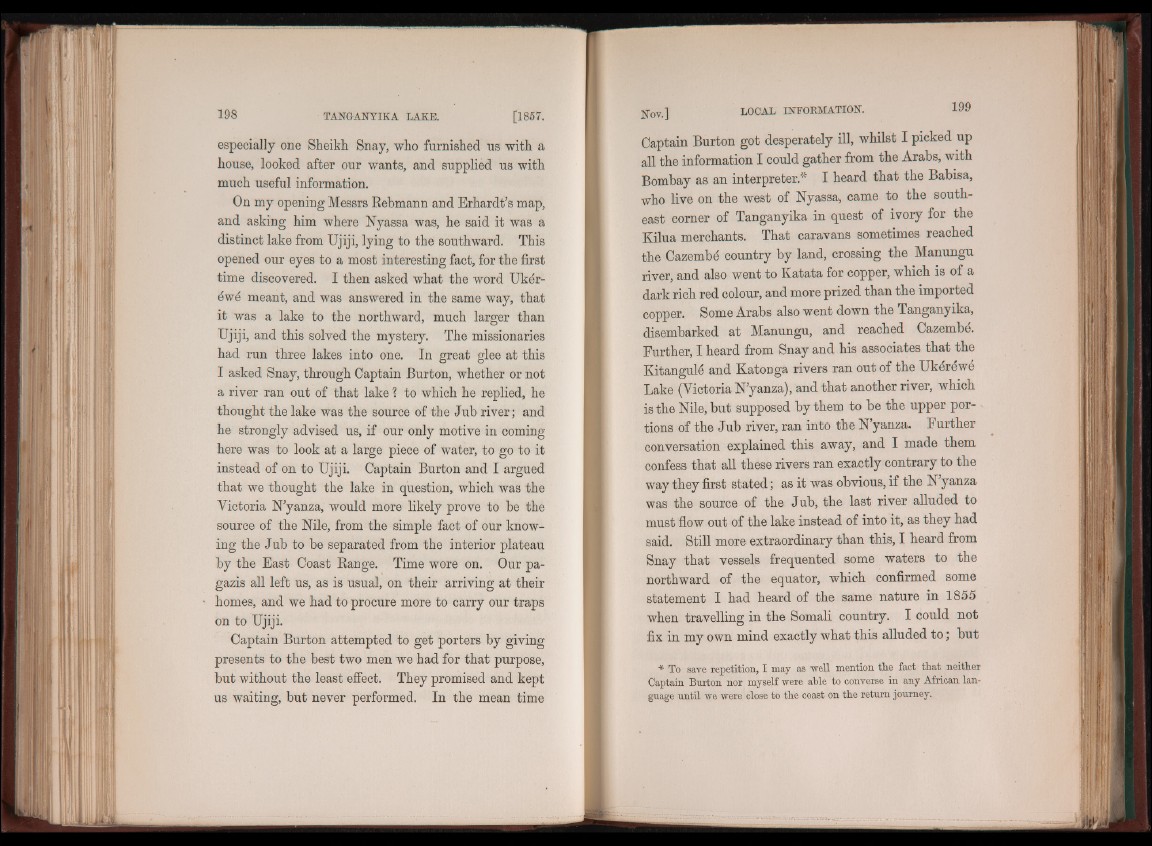
especially one Sheikh Snay, who furnished us with a
house, looked after our wants, and supplied us with
much useful information.
On my opening Messrs Rebmann and Erhardt’s map,
and asking him where Nyassa was, he said it was a
distinct lake from Ujiji, lying to the southward. This
opened our eyes to a most interesting fact, for the first
time discovered. I then asked what the word Ukdr-
dwe meant, and was answered in the same way, that
it was a lake to the northward, much larger than
Ujiji, and this solved the mystery. The missionaries
had run three lakes into one. In great glee at this
I asked Snay, through Captain Burton, whether or not
a river ran out of that lake \ to which he replied, he
thought the lake was the source of the Jub river; and
he strongly advised us, if our only motive in coming
here was to look at a large piece of water, to go to it
instead of on to Ujiji. Captain Burton and I argued
that we thought the lake in question, which was the
Victoria N’yanza, would more likely prove to be the
source of the Nile, from the simple fact of our knowing
the Jub to be separated from the interior plateau
by the East Coast Range. Time wore on. Our pa-
gazis all left us, as is usual, on their arriving at their
homes, and we had to procure more to carry our traps
on to Ujiji.
Captain Burton attempted to get porters by giving
presents to the best two men we had for that purpose,
but without the least effect. They promised and kept
us waiting, but never performed. In the mean time
Captain Burton got desperately ill, whilst I picked up
all the information I could gather from the Arabs, with
Bombay as an interpreter.* I heard that the Babisa,
who live on the west of Nyassa, came to the southeast
corner of Tanganyika in quest of ivory for the
Kilua merchants. That caravans sometimes reached
the Cazemb<3 country by land, crossing the Manungu
river, and also went to Katata for copper, which is of a
dark rich red colour, and more prized than the imported
copper. Some Arabs also went down the Tanganyika,
disembarked at Manungu, and reached Cazembe.
Further, I heard from Snay and his associates that the
Kitangul6 and Katonga rivers ran out of the UkdnSwe
Lake (Victoria N’yanza)> and that another river, which
is the Nile, but supposed by them to be the upper portions
of the Jub river, ran into the N’yanza- Further
conversation explained this away, and I made them
confess that all these rivers ran exactly contrary to the
way they first stated; as it was obvious, if the N yanza
was the source of the Jub, the last river alluded to
must flow out of the lake instead of into it, as they had
said. Still more extraordinary than this, I heard from
Snay that vessels frequented some waters to the
northward of the equator, which confirmed some
statement I had heard of the same nature in 1855
when travelling in the Somali country. I could not
fix in my own mind exactly what this alluded to ; but
* To save repetition, I may as well mention tlie fact that neither
Captain Burton nor myself were able to converse in any African language
until we were close to the coast on the return journey.